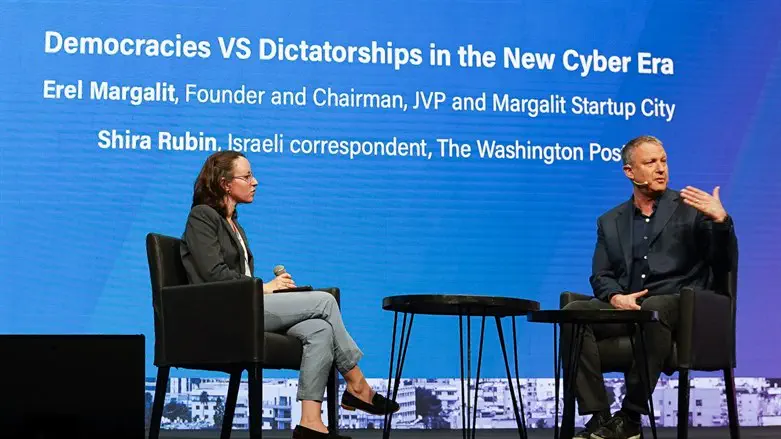
Erel Margalit, founder and chair of JVP and Margalit Startup City, spoke Wednesday during his appearance at Cybertech Tel Aviv about the Russian-Ukrainian war, and the economic sanctions that NATO have imposed on Russia following its invasion of Ukraine.
Margalit, who served in the past as an MK and was the head of the Subcommittee for Cyber Defense, said: “The current war has proven that the NATO alliance on its own isn’t sufficient. Leadership is required to establish a democratic cyber alliance, including NATO and other free countries, in order to lead values-based cyber that will support democracies and people, and will say, 'Enough!' to dictators and to those who support them.”
According to Margalit, one of the ways to establish a global cyber alliance is through the establishment of a global CERT (Computer Emergency Response Team), in which each democratic country is connected to existing CERT centers and shares responsibility to exchange information and intelligence, prevent attacks, and to deal with them correctly when they happen.
Margalit also discussed the important role Israeli cyber companies have to play in defending democracies: “The next stage of the war is the war on the financial realm. Even the economic and commercial sanctions that the NATO countries have imposed on Russia, at the heart of which is SWIFT, are not suitable for the new world of digital payments. A payment system is needed for the generation after SWIFT to allow the transfer of legitimate money and to block the transfer of money to criminals, dictators, and those who fund them.”
One of the companies working in this area is ThetaRay, from the JVP portfolio, which is establishing a new level of trust in the global financial system. ThetaRay’s technology allows the transfer of payments around the world by normative people and organizations and prevents suspicious transfers by totalitarian regimes and criminals. This system can replace SWIFT and allow the safe transfer of funds to legitimate people or organizations. It can be the answer to the NATO and Western policy when it comes to enforcing targeted sanctions on Russia.
Regarding general cyber trends, Margalit shared data produced by OPORA (Opora Adversary Behavior Analytics), another JVP company, which specializes in identifying IO trends. The data, which is based on looking at the last 24 hours, indicates a clear and sharp increase in attacks since the implementation of sanctions, seemingly from pro-Russian criminal organizations, including:
· An increase of more than 12 percent within the last 48 hours in attacks targeting banks and crypto services (bitcoin) from Europe, with an emphasis on Western Europe (at this stage the United States has been targeted less).
· An increase of 25 percent within the last 24 hours in sextortion campaigns or “individual extortion,” as well as doxing campaigns that gather people’s information, including intrusive and sexual information, which is used to extort or cause embarrassment.
· In parallel, there have been significant activities by cyber organizations on different criminal levels and at different levels of sophistication on both sides, both on behalf of Russia and on behalf of Ukraine, including open struggles between different criminal organizations. In general, there has been an increase of over 100 percent in cyber crimes in comparison to February 2021.


